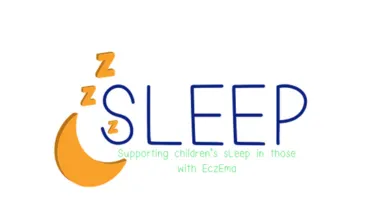Introduction of Sleep
Atopic dermatitis (AD) is a common childhood disease characterised by dry itchy skin. Many patients with AD also have sleep disturbance. Poor quality sleep affects memory, concentration and mood. Other studies have shown poor quality sleep has been associated with poorer educational outcomes. Patients who have AD and sleep disturbance, have a 40-50% higher chance of having ADHD than those without eczema. However we do not fully understand why this is. The Mind and Skin project aims to investigate the impact inflammation and itching caused by atopic eczema has on sleep disturbance and how this affects the brain.
We hypothesise that the cutaneous inflammation in AD, associated with itching and scratching and amplified by sleep disturbance and circadian rhythm disruption, leads to systemic inflammation as well as ii) cognitive, structural and functional brain impairment, as well as indirectly measurable brain inflammation, iii) which normalise when the skin inflammation and sleep improve as a result of treatment, and iv) that the above associations are correlated to AD severity and degree of sleep disruption.
Aims
Primary objective: To analyse the cutaneous and systemic inflammatory profiles, sleep disturbance and circadian rhythm patterns, cognitive functioning and neuroimaging in those with severe AD compared to those with milder AD and healthy controls.
Secondary objective: Comparing cognitive and brain function abnormalities between AD, ADHD, and healthy controls.


